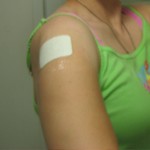Transdermal Myelin Peptides May Be Safe, Effective in MS
A myelin peptide skin patch safely reduced active MRI lesions and clinical disease activity in relapsing-remitting MS
Transdermal application of myelin peptides may be a safe and effective therapy for patients with relapsing-remitting multiple sclerosis (RRMS), according to findings from a one-year, double-blind, placebo-controlled cohort study published online July 1 in JAMA Neurology (Walczak et al., 2013).
 “Induction of antigen-specific tolerance in [MS] remains the ultimate goal of therapy for this disease,” wrote Agata Walczak, M.D., Ph.D., of the Department of Neurology of the Medical University of Lodz in Poland and colleagues. “All currently available therapies in MS attenuate global function of the immune system without discrimination of antigen specificity. … In contrast, antigen-specific therapy aims to selectively target cells specific for a given antigen, thus disabling only a small part of the immune system responsible for an autoimmune response, which for MS includes antigens associated with the myelin sheath.”
“Induction of antigen-specific tolerance in [MS] remains the ultimate goal of therapy for this disease,” wrote Agata Walczak, M.D., Ph.D., of the Department of Neurology of the Medical University of Lodz in Poland and colleagues. “All currently available therapies in MS attenuate global function of the immune system without discrimination of antigen specificity. … In contrast, antigen-specific therapy aims to selectively target cells specific for a given antigen, thus disabling only a small part of the immune system responsible for an autoimmune response, which for MS includes antigens associated with the myelin sheath.”
The study goal was to evaluate the safety and efficacy of transdermally applied myelin peptides, an antigen-specific therapy, in patients with RRMS.
At a referral center, 30 outpatients 18 to 55 years of age with RRMS were randomized to receive a skin patch containing placebo (n = 10), 1 mg each of three myelin peptides (MBP85-99, MOG35-55, and PLP139-155; n = 16), or 10 mg each of these peptides (n = 4). All participants completed study treatment.
Compared with patients receiving placebo, those receiving the 1-mg myelin peptide skin patch had a 66.5% reduction in the cumulative number of active gadolinium-enhanced (Gd+) lesions per patient per magnetic resonance imaging (MRI) scan (P = .02) during the 12-month study period. Other benefits in this group were apparent in number of Gd+ lesions, changes in T2 lesion volume from baseline to study end, and development of new T2 lesions, suggesting a reduction in the opening of the blood-brain barrier and a decrease in the generation of new inflammatory lesions.
Transdermal myelin peptides also appeared to reduce the generation of established MRI lesions, as T1 lesion volume was also decreased in the 1-mg myelin peptide group.
In terms of clinical disease activity, the 1-mg myelin peptide skin patch group also fared better than the placebo group in annual relapse rate (0.43 vs. 1.4; P = .007) and proportion of patients who were relapse-free (1/10 vs. 10/16; P = .049).
There were no reports of serious adverse events, and tolerability of the myelin peptide skin patch was good.
“In patients with relapsing-remitting [MS], treatment with a myelin peptide skin patch significantly reduced both MRI and clinically defined measures of disease activity and was safe and well tolerated,” the study authors wrote.
Study limitations included small sample size and the small number of patients in the high-dose myelin peptide treatment group, precluding statistical analysis of those data.
“[T]he efficacy and safety profiles that have emerged from this study make the transdermal application of a mixture of 3 myelin peptides, MBP 85-99, MOG35-55, and PLP 139-155, an attractive and promising therapeutic approach in patients with relapsing-remitting MS,” the study authors concluded. “In particular, this antigen-specific therapy using a myelin peptide skin patch offers selective immune intervention targeting MS-related antigens while sparing other mechanisms critical for immune protection.”
Key open questions
- What is the optimal dosage regimen for transdermal myelin peptide treatment in patients with relapsing-remitting MS?
- Would transdermal myelin peptide treatment be useful in patients with other forms of MS?
Image credit
Kjirstin Bentson, Creative Commons
Disclosures
Dr. Selmaj has served on scientific advisory boards for Novartis, Biogen Idec, ONO Pharma, Genzyme, Roche, Synthon, and Teva and has received payment for lectures for Novartis, Biogen Idec, ONO Pharma, and Merck Serono. Dr. Walczak has received consulting fees from Novartis.


